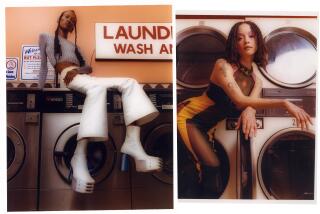PRACTICAL VIEW : What to Do When You Get Scorched at the Dry Cleaners
- Share via
The ink is still fresh on your check when you notice the problem--a scorch mark, missing button or rip.
Squelch your impulse to launch into a tirade; instead, take constructive steps to resolve conflicts with a dry cleaner.
First, try to solve the problem with the proprietor, suggests Pastor Herrera, director of consumer affairs for Los Angeles County.
Some cleaners make that easier than others.
Philip’s French Cleaners in Pacific Palisades, for example, guarantees its work and replaces lost or damaged buttons free of charge. “We try hard to be fair and always discuss the problem with a customer,” says co-owner Meera Cho.
If one-on-one attempts fail, Herrera recommends filing a complaint with the consumer protection agency in your area. Los Angeles, San Bernardino, Ventura and Riverside counties operate consumer affairs departments. Consumers simply fill out a form. When possible, claim tickets, clothing receipts and any other documents to support a claim should be attached. The department then sends a copy of the complaint to the vendor.
How effective is the system?
“We have a very low resolution rate” Herrera concedes. “Because it is often difficult to substantiate the complaint, the cleaner does not resolve (matters) so easily.”
The consumer affairs department--which also serves the city of Los Angeles--also offers a dispute settlement service, free of charge, to willing parties.
When all else fails, consider small claims court. For an $8 fee, you can state your case before a judge or panel. The plaintiff, or the person making the claim, has no right to appeal a ruling, Herrera says, but the cleaner, or the defendant, may do so.
“It is important to come prepared to state the facts,” Herrera says, adding that witnesses are helpful.
The dry cleaner may not be at fault if dry-clean-only clothing has been laundered at home, for example, or if a manufacturer has mislabeled its product.
To prevent dry-cleaning problems, take the following precautions:
* Keep claim tickets, they’re your only tangible proof of drop-offs.
* Read the signs. Some cleaners state that problems must be brought to their attention with 24 hours. And many stipulate that they are not liable for broken buttons, zippers and other notions.
* If your cleaner doesn’t post signs, ask questions; get a sense of what to expect.
* Detach and keep one-of-a-kind buttons to protect against their loss.
More to Read
Inside the business of entertainment
The Wide Shot brings you news, analysis and insights on everything from streaming wars to production — and what it all means for the future.
You may occasionally receive promotional content from the Los Angeles Times.








